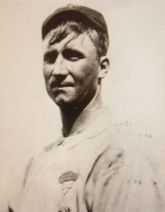Charlie Faust
| Charlie Faust | |
|---|---|
 | |
| Pitcher | |
|
Born: October 9, 1880 Marion, Kansas | |
|
Died: June 18, 1915 (aged 34) Steilacoom, Washington | |
| Batted: Right | Threw: Right |
| MLB debut | |
| October 7, 1911 for the New York Giants | |
| Last MLB appearance | |
| October 12, 1911 for the New York Giants | |
| Career statistics | |
| Win-loss record | 0-0 |
| Earned run average | 4.50 |
| Games pitched | 2 |
| Teams | |
| Career highlights and awards | |
Charles Victor Faust ("Victory") (October 9, 1880 in Marion, Kansas – June 18, 1915 in Steilacoom, Washington) was an American Major League baseball player whose career, statistically speaking, was only slightly lengthier than that of Moonlight Graham, but who was regarded by his team, the New York Giants, as a good luck charm.
His story was told by Giants center fielder Fred Snodgrass in Lawrence Ritter's (1966) The Glory of Their Times. Here is a capsule summary:
Also known as Charlie Faust, he won a spring tryout with the Giants in 1911, after informing manager John McGraw that a fortune teller back home in Kansas had told him he needed to go pitch for the Giants and help them win the pennant. Faust had no real pitching ability, but McGraw was a superstitious sort, and the Giants had not won the league championship since 1905, so he brought Faust along.
McGraw actually put Faust on the mound for a couple of innings in different games, late in the 1911 season, after the Giants had already clinched the league title: October 7, then again on October 12 (the final game of the regular season). In both games, the Giants were already trailing, and Faust was brought in at the top of the ninth.
According to Gabriel Schechter's 2000 book, "Victory Faust: The Rube Who Saved McGraw's Giants", Faust was persistent in his belief that he could contribute to the Giants' success. Faust's delusion seems to have been associated with some mental disorder; he was later institutionalized in Oregon and in Washington state. When McGraw dismissed him from the Giants, Faust was never able to adjust to his release and harbored hopes of rejoining major league baseball until the final illness that led to his death.
Although Snodgrass's recollection from half a century previous to his report was for decades the definitive information about Faust, it was not entirely accurate. According to that report, Faust stuck with the team for three seasons, mostly as a mascot rather than a roster player. However, according to later research by Schechter, Faust's tenure with the Giants was limited to the 1911 season, when the Giants won the pennant but lost the World Series to the Philadelphia Athletics 4 games to 2.
Similarly, Snodgrass said that Faust died that winter of 1913-14, which is incorrect. Faust was committed to a mental institution in Steilacoom, Washington in 1914 and died there of tuberculosis on June 18, 1915, at the age of 34. He was buried in Steilacoom, and a memorial marker was placed in the family plot in his hometown cemetery in Marion, Kansas.
Faust is mentioned in E.L. Doctorow's novel Ragtime.
External links
- Retrosheet link to the two games Faust played in
- Baseball Reference entry
- Baseball Almanac entry
- BaseballGuru.com
- The Baseball Biography Project
|